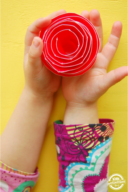When teaching children self-control, using traditional exercises for self control is just too boring! Raising kids in control sets them up for success in the future and it can be easier than you think with these simple and fun self control activities and games. No matter your age, raising your impulse control is a positive outcome!

TEaching Children Self-Control
One of the hardest things about raising kids is parenting with consistency in a way that empowers kids to learn self control, impulse control and delayed gratification. Thankfully there are ways to help kids improve their delayed gratification ability through play and we have listed 20 self control activities for kids below.
Related: Good Manners for Kids
Kids Taking Control in Every Day Life
We have all had those days, those situations where it would be MUCH easier to give in at cost for the greater good. Here are some easy strategies to give you the strength to quickly determine with confidence what your next parenting step might be…
It is “just a snack”
Imagine you are cooking dinner and your child is starving. You tell him to wait, but he whines and cries and pouts. You are tired of listening to him, whine so you allow him to have a snack. Teaching kids self-control is hard.
It is “just a toy”
Or imagine you are at a store and your child sees a toy that he really, really, really wants more than anything in the whole world. You just want some peace while you shop, so you let him have the toy and agree to buy it at the end of the shopping trip.
It is “just for today”
Or imagine you child desperately wants to play at a friend’s house, but right now you are leaving as a family for a commitment or obligation. You child does not want to go with you. He wants to go to a friend’s house. Okay fine. You make a concession and allow him to go to the friend’s house instead.
But wait?
What if I told you holding your boundary firm and making your child wait was the single most important skill you can teach your child.

Teaching kids delayed gratification is a Priority
A longterm study following 1,000 children from birth to age 32 years old had surprising results. This study shows that…
…childhood self-control predicts physical health, substance dependence, personal finances, and criminal offending outcomes, following a gradient of self-control.
–PNAS, A Gradient of Childhood Self-Control Predicts Health, Wealth and Public Safety Study
This research shows that children with worse self-control which included measurements of: persistence, impulsivity and attention regulation from ages 3-11 tend to have worse health, earn less, and commit more crimes 30 years later.
This reminds me of the marshmallow test from many years ago…

The Stanford Marshmallow Test Experiment
The Stanford marshmallow experiment was a psychological study conducted in the late 1960s to early 1970s, in which children were placed in a room with some tasty snack, such as a marshmallow, and told that if they could wait for a short while before eating it then they will get an extra snack as a reward.
–Effectiviology, The Stanford Marshmallow Experiment: How Self-Control Affects Success in Life
In this series of experiments on delayed gratification, kids were offered a choice: get one reward right now or wait twenty minutes and get two rewards. The reward was often a pretzel, marshmallow, or mint.
The single reward was placed on the table, while the researcher left the room for about 20 minutes. As each child sat alone in the room staring at their marshmallow, they had to decide to wait and get double the marshmallows or eat the single marshmallow without waiting.
The Results of Delayed Gratification in Children
In follow-up studies, the researchers found that children who were able to wait longer for the larger reward tended to have better life outcomes. This was measured by test scores, educational achievement, healthy weight in adulthood, and more.

Impulse Control Activities for Kids
We thought it was a good idea to come up with 20+ ways to teach kids self-control or delayed gratification through play. The good news is you do not have to wait until the confrontation over snacks, toys or going to a friend’s house to teach a lesson.
Just like the marshmallow study itself, these things can be playful games that teach over time. Pick whatever delayed gratification activities work for your family! Which is these ways to play and teach self control fits best into your parenting style?
20 Children Self-Control Activities

1. Red Light, Green Light, Game To Learn Self- Control
Play red light, green light. This game requires kids to start and stop. They can’t just get to the end. They have to be patient! You could even add some extra transitions like yellow light.
2. Saving Money To Teach Kids Self Control
Teach kids to save money for something bigger they really want. We live in a world of instant gratification and this is not only a great way to teach kids about money, but to be patient and work hard for what they want. And not by frivolous things in between.
3. End Of The Day Reward
Create an end of the day reward if kids complete all their chores. It’s easy to do what we want when we want, but sometimes we have to do things that we don’t want to do. That’s called discipline. And not discipline as in behavioral correction, but discipline as in self control. And this teaches kids that self control is rewarded in the long run.
4. Self Discipline When It Comes To Food
Teach kids to wait for dinner, despite being hungry, rather than giving snacks close to mealtimes. Sometimes kids get hungry right around a meal time. But if they snack they won’t eat the meal we made. So sometimes waiting for supper is the ideal thing to do.
5. Memory and Focus Games To Teach Self Discipline
Play games that require focus and attention like memory or Jenga. It’s easy to be distracted with everything around us. Sometimes we need to focus on the task at hand and this is where these games can come into play.

6. Waiting In Line Instead Of Cutting
Teach your child to wait at the end of the line instead of cutting in front. It’s tempting to cut the line because we are impatient. But we cannot do that. Not only is it considered rude, but it upsets other people who were already waiting.
7. Freeze Tag To Teach Patience
Play freeze tag. Freeze tag is a great way to teach patience. It’s fun, but sometimes you have to wait until someone comes and unfreezes you!
8. Place A Birthday Wish On Your Christmas List
Teach your kids to put a toy they really want on their birthday or Christmas list rather than buying it right away. This teaches them to wait and be patient, because they can’t always have everything they desire right away, as much as we’d like to give it to them.
9. Meditation To Teach Self Control
Help your child practice yoga or meditation (this could be as simple as asking them to take 5 deep breaths) where they must sit still for a certain period of time. Kids are sometimes hyper, overstimulated, rambunctious, and sitting down and breathing can help them take time to sit and be calm.
10. Staring Contests To Teach Self Control
Have a staring contest. This is a fun example of not being able to do what you want when you want to do it. You may feel like you want to blink, but if you blink you won’t win.

11. Wait Their Turn
Teach your child to wait for another child to finish using a toy before he can play with it. Kids don’t quite understand they need to take turns when they’re little. And teaching them to wait their turn is a great way to teach patience and self control.
12. Follow The Leader
Play follow the leader. Follow the leader is a great way to learn self control. You can’t do what you want, rather you have to do what the leader is until it is your turn to be the leader.
13. The Quiet Game
Play the quiet game where everyone needs to be as quiet as possible and the first person to talk or make noise is out. We used to play this in elementary school. It was called quiet as a mouse. It’s easy to make noises, but it takes a lot of self control to be quiet.
14. Story Time Helps Teach Self Control
Have kids sit for storytime to improve focusing skills. In order to help kids focus on the story it is helpful to ask questions while reading or at the end of story time.
15. Listening Activity
Complete a listening activity where your child must repeat back instructions to you.

16. Solo Play For Kids To Learn Self Control
Have kids play alone for at least 30 minutes a day. This encourages kids to have enough self-control to problem solve with their toys and entertain themselves without outside support.
17. A Gentle Reminder Of No Interrupting
Teach kids to wait to interrupt you using the interrupt rule: putting their hand on your shoulder or leg to let you know they need to interrupt you.
18. Waiting For Dessert
Teach your children how to wait for a treat like a cookie or a cupcake. We all love sweets! They’re tasty! But we need to wait until after dinner or when the time is appropriate so we don’t spoil our appetite or get a tummy ache.
19. Learn To Self- Regulate Emotions
Teach your kids to self-regulate emotions. If your child is fussing or protesting, allow your child the opportunity to calm themselves a bit before intervening. This can be done by breathing techniques, going to their room, counting to ten and pressing their fingers together, etc.
20. Praise The Effort Of Your Child’s Hard work
Praise for effort and encourage hard work to achieve goals, rather than doing the work for your kids.
21. Simon Says
There are so many fun games that promote good behaviors at home or in the classroom. And Simon says is a great game that promotes self-control skills as well as social skills. Everyone needs the self-regulation skill, and waiting for Simon says to do something is a great way to help children grow.
22. Freeze Dance
I played this as a child. And it is a fun activity that shows young children self control. When the music plays, you dance. When the music stops, you freeze. It’s a great game for teaching self-control. And the last person wins. Musical chairs is another similar game. And they double as physical activities that even older kids can benefit from.
Delayed Gratification Skills in Children
Delayed gratification (or self-control) is the single most important skill you can teach your child. This valuable skill not only translates into better-behaved children (it really does!), but it also shapes them into fabulous adults and develops great listening skills which are all we can hope for our kids!
More Advice from Real Moms Here at Kids Activities Blog
- How to help your child pay attention
- Parenting a child with ADHD is the hardest thing I have ever done
- 5 Strategies for helping your child with ADHD
- How to help a child stop whining
- Check out these fun fidget toys!
- Games to help kids with public speaking
- We love these escape room for kids ideas
- Asking yourself “At what age should I let my kid shower alone?” Click here for answers!
Do you have any advice how to increase a child’s ability for delayed gratification and self control? What works at your house? Please let us know in the comments below.






















0